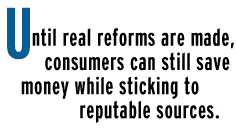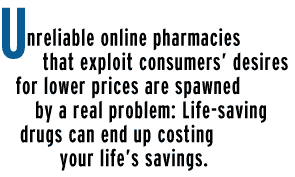| |||||||||

Watch out for pitfalls of online drug orders
 Hundreds of Web sites offer prescription drugs for bargain prices. But you'd have to have a high threshold for pain before you'd want to order from some of these sites. Hundreds of Web sites offer prescription drugs for bargain prices. But you'd have to have a high threshold for pain before you'd want to order from some of these sites. One global business that's generated numerous complaints is Pharma-International. The company is based in Karachi, Pakistan, but its Web site prominently displays U.S. voice mail and fax numbers. Pharma-International's home page links to a separate Web site, the so-called Foreign Pharmacies Organization. This site, in turn, offers to send consumers via e-mail a list of foreign pharmacies. People who request the list, however, receive an automatically generated e-mail that lists only one pharmacy: Pharma-International. A little research into the two sites reveals that they are hosted by the same company. Although Pharma-International boasts of low prices, consumers have complained that the much-hyped products they've paid for have never arrived. As a result of such complaints, credit card giant Visa International on Jan. 13 revoked the e-tailer's privilege to accept plastic. The company now instructs customers to pay for orders by sending wire transfers to a bank in Thailand. Boy, that sure inspires my confidence. Pharma-International failed to reply to repeated voice mails and e-mails seeking comment for this article.
Unreliable online pharmacies that exploit consumers' desires for lower prices are spawned by a real problem: Life-saving drugs can end up costing your life's savings. Canada and some European countries regulate the price of prescription drugs, but the United States and many others do not. This causes wide differences in drug prices around the world. Some entrepreneurs use this fact to promote "no-prescription-required" offers on the Internet. According to an analysis by U.S. Rep. Bernard Sanders, I-Vt., pharmaceutical companies are by far the most profitable industry group in the Fortune 500. Sanders says if distributors were allowed to re-import approved, packaged drugs, U.S. prices would drop 30 percent to 50 percent. A law to do just that was passed last fall by Congress. But it was not implemented by the Clinton administration, which said deal-killing loopholes had been slipped into the bill at the last minute. Until real reforms are made, however, consumers can still save money while sticking to reputable sources: • Use a doctors' alliance: Both the United States and Canada, as well as many other countries, permit consumers to import small amounts of prescription drugs for personal use. Some Americans, therefore, make regular pilgrimages to Mexico or Canada to fill their prescriptions. But doctors in Vermont have developed a simpler way. They formed a United Health Alliance last year to order drugs cheaply from Canada on behalf of their patients. Each participating doctor faxes a signed prescription form to a Canadian pharmacy. The pharmacist mails a parcel with legitimate drugs to the doctor. The package is then given to the patient unopened, so the doctor isn't personally dispensing medications. • Purchase from a verified online pharmacy: If you wish to fill a prescription online without your doctor's involvement, you should use a pharmacy that's verified by the National Association of Boards of Pharmacy. Despite the word "national" in its name, the NABP represents state and provincial pharmacy boards throughout the United States, Canada, Australia and New Zealand. It certifies trustworthy online pharmacies worldwide. • Use a pharmacy bot: Consumers who order online should always check the latest prices for drugs using shopping bots, such as DestinationRx, RxBestDeals and mySimon (which is owned by CNET Networks, publisher of News.com). These services compare prices from numerous NABP-certified online pharmacies, including Drug Emporium, Walgreens and Drugstore.com. You'll quickly find that you can save more than 30 percent just by using one online pharmacy over another. Be sure to remember that a site's customer service and shipping policies may be as important as price. And whatever you do, don't send wire transfers around the world to bogus sites just to save a buck. Consumer advocate Brian Livingston appears at CNET News.com every Friday. Do you know of a problem affecting consumers? Send info to tips@BrianLivingston.com.
who's speaking? |
|
|||||||||||||||||||||||
|
Send us news tips | Contact Us | Corrections | Privacy Policy |
|

